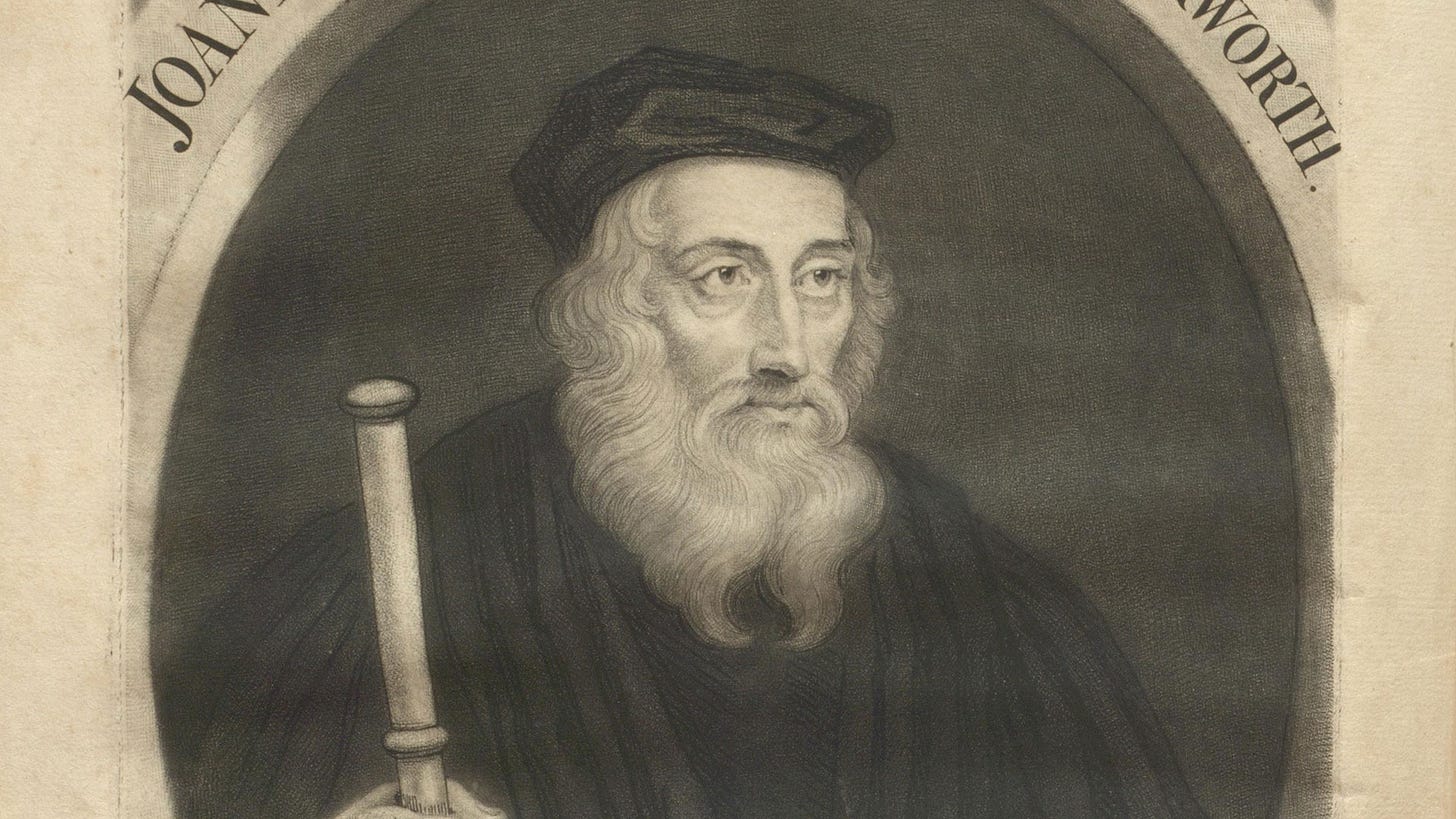Relying heavily on Isidore’s formulation of secular power as it appeared in the Decretum, John Wycliffe (1331-1384):
“The temporal lords have power given to them by God, so that where the spiritual arm of the church does not suffice to convert the antichrists by evangelical preaching, ecclesiastical admonition, or the examples of virtues, the secular arm may help its mother by severe coercion.”[1]
Hence, Wycliffe referred to rulers as vicars of God while priests were vicars of Christ. (Stylistically similar, John Norton (1606-1663) later designated magistrates “civil pastors.”).
In Wycliffe’s view, rulers are specially charged not only with their own virtue but that of their kingdom which they rule by Christ’s grant of authority and under the law of God. The ruler is a servant of Christ, as a god upon the earth, and responsible for the souls of his people.
With such a tall order before him, reasoned Wycliffe, how could temporal rulers ignore the welfare of the church and her doctrine?
“For this reason princes ought faithfully to note the decree of Isidore where the opinion is advanced that whether the Church increases or decreases, Christ will require a reckoning from them in the day of judgment, of how they have exercised in this ministry the power which he gave them… Who, therefore, sober of mind, will be offended toward the secular arm because he is reasonably charged with the perpetual salvation of himself and the people, whose government God entrusted to him?”[2]
Franciscus Junius (1545-1602) would say much the same thing in his Mosaic Polity: “For the magistrate in his political order assists his society in aspiring to the gate of eternal salvation, and so does the ecclesiastical minister, through the support of human society and the influence of a good magistrate.”[3]
Of course, Wycliffe’s interest was in purifying the church by freeing its clergy of foreign (i.e., temporal) entanglements, to him a source of corruption. Such motivations do not imply mere pragmatism, however.
This is the point: When the state is coercing adherence to right doctrine and morals preached by the church it is then not acting strictly on its own accord unto temporal happiness. Rather it is acting as an extension of the church—herself not having this kind of coercive authority—since it lacks direct legislative competence in matters of religion, special revelation, and grace.
Certainly, by its nature and charge, the temporal power has its own duties for the good of man that are not an extension of the church.
But when it is acting to enforce church morals or discipline, as it is required to do, it is no longer acting solely on its inherent power as such, but rather according to its duty to the church and, in this way, as an extension of church authority.
There is also a distinction, if sleight, to be made between the magistrates protection of the church from outside force and even in maintaining unity amongst and within the church, and when the magistrate acts to enforce church orders proper to it—that is, not encroaching on the church’s power but rather acting of its own authority which nevertheless lacks external coercive capability.
We know that in these instances the magistrate is operating as the secular arm of the church because he lacks direct legislative competency to decide the issue on his own but rather must defer to church competency and direction prior to acting, as said.
Fidei Defensor
As the Cambridge synod put it in their Platform of Church Discipline (1648):
"It is the duty of the magistrate to take care of matters of religion.... The end of the magistrate’s office is ...godliness." It is the duty of the magistrate to punish and repress "idolatry, blasphemy, heresy, venting corrupt and pernicious opinions ...open contempt of the word preached, profanation of the Lord’s Day."
Should any congregation dare to "grow schismatical" or "walk incorrigibly or obstinately in any corrupt way of their own," the magistrate was to "put forth his coercive power." And if the state was to be the strong coercive arm of the church, so the church, in turn, was to foster in the public the duty of obedience to the state rulers: "Church government furthereth the people in yielding more hearty...obedience unto the civil government."
Where we should distinguish ourselves from Roman Catholic doctrine is in a matter of legislative competency by the state in so-called natural religion. Whereas our Papal counterparts would, upon the introduction of the church to human, natural, salvation, whatever, history (i.e., time), assign competency of religious matters—natural and supernatural—and so all theology to the church alone, we might suggest otherwise.
The state can operate on its own competency in natural things, even the things of this life that reveal true if limited and non-salvific, theology. The Decalogue is such knowledge. That there is a creator God that deserves worship is another general principle of natural theology accessible to all. When the state acts to defend these truths and those like it, it is acting within its own inherent juridical power and competency. And even here it is supporting the church, if in a remote way. As I’ve written elsewhere, Protestants of time’s past have maintained that natural truths are prepatory for the reception of higher truths (i.e., special revelation). In this sense, just, reasonable human positive law promulgated by magistrates prepares men for embrace of the church and her deposit of truth.
Yet when it acts to thwart heresy or enact policy predicated on church doctrine, as well as when it finalizes church discipline—or even in the Erastian context of assuming such discipline to itself—it is acting as the secular arm of the spiritual power.
[1] William E. Farr, John Wycliffe as Legal Reformer (Leiden: E.J. Brill, 1974), p. 71 (quoting Wycliffe).
[2] Matthew Spinka, Advocates of Reform from Wyclif to Erasmus (Philadelphia: Westminster John Knox Press, 1953), p. 60 (quoting Wycliffe).
[3] Junius, The Mosaic Polity (Grand Rapids: Christian’s Library Press, 2015), p. 25.




